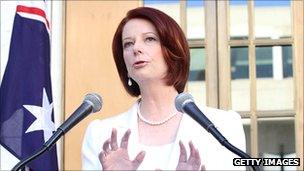Australian PM Julia Gillard drops Malaysia asylum plan
- Published

Gillard failed to secure parliamentary support for the changes needed for her Malaysia swap plan
Australia is dropping a controversial asylum plan and will now process asylum seekers onshore after the government failed to secure support for key legal changes.
PM Julia Gillard needed parliamentary backing for legislation allowing her "Malaysia swap" plan to go ahead.
But she could not secure enough votes to get the legislation passed.
Australia's asylum policy has been in crisis since a court ruled a plan to swap refugees with Malaysia unlawful.
Under the plan, Australia would have sent 800 asylum-seekers who arrived by boat on to Malaysia and would have received 4,000 refugees in return over four years.
But the court ruled that Malaysia - which has not signed UN refugee conventions - did not offer adequate protection.
'Best outcome'
Ms Gillard had sought to get legislation passed in parliament that would allow the plan to go ahead.
But the opposition did not back the move and Ms Gillard - who leads a minority government that depends on the Greens for support - did not have the votes.
She said that although she believed the Malaysia plan was the "best policy outcome" for Australia, her government was not in a position to implement it.
"It's clear that the migration law of this country will not be amended, and as a result the government is not in a position now... to have asylum seekers processed in third countries," Ms Gillard said.
The court judgment also effectively ruled out sending asylum seekers to a processing centre in Papua New Guinea - something Australian officials had been discussing with the PNG government.
Australia detains all asylum seekers who arrive by boat, some on the mainland and some at the Christmas Island detention centre.
Last year 6,535 asylum-seekers arrived in Australia by boat.
The government says its "Malaysia swap" plan was aimed at deterring people from making the dangerous sea voyage.
Both parties have sought to appear tough on asylum, despite recent opinions polls which suggest many Australians support onshore processing of asylum seekers.
The opposition supports the reopening of a processing centre on the Pacific island of Nauru, which signed the UN refugee convention late last month.
- Published19 September 2011
- Published12 September 2011
- Published1 September 2011
- Published31 August 2011
- Published25 July 2011
- Published16 December 2010
- Published19 August 2010
- Published17 June 2011